Learn everything about Sorare’s football fantasy manager in our Sorare guide. We’ll prepare you optimally for your career as a manager and help you find the right team from the start. Make sure to read this beginner’s guide carefully because initial mistakes can cost you a lot of money. Are you wondering how Sorare works? Then this guide is perfect for you.
What is Sorare?
Sorare is a football fantasy manager where you can compete against other managers with digital playing cards in different leagues. Here, you can buy, trade, sell cards, and even earn real money.
Sorare is based on blockchain technology and generates unique digital playing cards, known as NFTs. These digital cards are one-of-a-kind in the world. NFTs are traded on Sorare in the currency Ethereum (ETH or Ξ).
Each week, you compete against other managers with your cards and can win exciting prizes with the right team.
Is Sorare Free?
You can generally register for free on Sorare* and participate in tournaments without depositing any money. There are two ways to play without making a deposit:
- Basic and Advanced Tutorial in Pro Mode
- Rivals
With “common” cards, you can participate for free in the amateur leagues of the 5 largest European leagues on Sorare and win more cards with good performance. If you set up your team correctly and make it into the top 200, you will receive a card of the next rarity level (limited card) as a reward from Sorare. With enough cards of this rarity level, you can either participate in additional competitions or sell the cards directly on the transfer market to earn cryptocurrencies in the form of Ethereum.
So, you can play Sorare without depositing any money and still potentially earn real money with some luck. Register through this link*, and you’ll receive a limited card from Sorare for free.
I myself have already made it into the top 200 once, even though I honestly hardly pay attention to the amateur leagues and don’t put much effort into it. With some strategy and the right football knowledge, it is definitely possible.
Is Sorare reliable?
Yes, Sorare is legitimate. The company from France is now an established business and does everything it can to ensure the platform is secure. They use two-factor authentication to keep both your account and ETH wallet safe. So far, no negative reports have been made.
I have also been playing Sorare since the end of 2021 and have had no issues so far. Therefore, I can definitely confirm that Sorare is legitimate. You don’t need to deposit a cent initially and can start playing for free. I hope my Sorare guide can convince you of its legitimacy.
First Steps and Registration
To play, you need an account. You can easily and quickly create this account at Sorare.com*. It’s completely free, and you can start playing without making a deposit.

You can also sign up with your Google or Facebook account.
After that, you will be asked for your phone number. This is necessary to secure your account. Even though you can play for free, you have a real account linked to a crypto wallet where you can deposit and withdraw money. Even if you don’t deposit any money, you can still win real money through good performance. Therefore, security for your account is very important.
You’ll need to confirm your phone number with a code, and then your registration is almost complete.
Setting Up Your Club
Next, you’ll create your own club with a nickname and club name. With this information, you’ll be visible to other managers and participate in tournaments. You can also upload a profile picture. These details can be changed later in the settings if you’re not satisfied with your initial choice. So, it doesn’t have to be perfect right away.
In the next step, you can choose a sport. Sorare offers not only a football fantasy manager but also ones for the U.S. NBA (basketball) and MLB (baseball). You don’t have to choose just one sport; you can play all three with the same account.
After successful registration, Sorare currently gifts you a limited card, with which you can participate in the free basic tutorial and win various prizes. Additionally, after activating your account, you can join Rivals and compete with like-minded people in the arena. But more on that later.
Take your time to explore the platform. If you want to dive straight into Pro Mode, you can, of course, buy cards directly from the transfer market.
Cards in Sorare
In Sorare, there are playing cards with different rarity levels that allow you to participate in various tournaments. The rarer the card, the more expensive it is on the transfer market.
You can obtain cards as rewards for performing well in tournaments, from boxes, or by purchasing them on the transfer market. We will cover this in more detail later in this Sorare Guide.
Each season, new cards for a player are issued and can be acquired through auctions. However, you can also continue playing with cards from the previous season. So, you don’t need to buy new cards every year to keep participating.
Different Card Rarities
Rarity determines the scarcity of a card. Currently, there are five different rarity levels for each player, which not only determine the card’s collectible value but also qualify you for participation in different championships. Additionally, the rarest cards come with an extra bonus, making them stronger than other cards when used in the various leagues.

The cards are categorized as follows:
- Common
- Limited
- Rare
- Super Rare
- Unique
These categories have the following characteristics:
So far, the maximum number of cards per player per season has not been fully utilized, meaning that some limited cards, such as the 500 out of 1000 for a player, may not exist. Sorare uses this approach to manage the market.
Information on the Player Cards
Each player card contains several useful pieces of information. The combination of all these details makes each card unique. Certain combinations may even attain collector value.
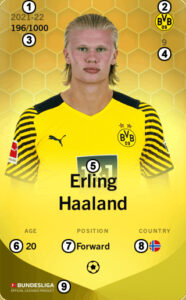
- Season: Indicates the season from which the card originates. Each year, new cards are issued for the player as long as they are in leagues licensed by Sorare.
- Club: Shows the club the player was with during that season. If the player changes clubs in real life, the card retains the original club logo.
- Serial Number: This number, combined with the season, makes the card unique. Popular serial numbers, like #1 or the player’s jersey number, often hold collector’s value.
- Jersey Number: The number the player wore at their club during the season.
- Player’s Name: The name of the player featured on the card.
- Age: The player’s age at the time the card was issued. This age, like the club, does not change on the card.
- Position: The playing position of the player.
- Nationality: The country the player is from.
- License Information: If applicable, this shows the license for using the player’s data
Player Strength and Card Bonus
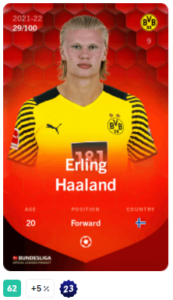
In addition to the information on the card, you will often find additional details about the player’s strength and availability either above or below the card.
The number ![]() indicates the player’s current strength. It shows the average score of the player in the last 5 games without considering bonus points. The higher the number, the stronger the player and the higher the likelihood of getting good points when using this player card.
indicates the player’s current strength. It shows the average score of the player in the last 5 games without considering bonus points. The higher the number, the stronger the player and the higher the likelihood of getting good points when using this player card.
WARNING: The player’s strength can be misleading. Sorare does not include games in which the player did not participate. So if the player only appeared in one of the last 5 games and performed well on that day, their strength will appear high. However, if the player does not participate in subsequent games, this will not benefit you. Always ensure that the player is regularly in action.
Sometimes instead of a number, you will see “DNP” ![]() (Did Not Play). This indicates that the player did not play in the last 5 games. This means the player has been injured for a while or is a benchwarmer who does not significantly contribute to the team.
(Did Not Play). This indicates that the player did not play in the last 5 games. This means the player has been injured for a while or is a benchwarmer who does not significantly contribute to the team.
Usually, next to the player’s strength, you will find the card bonus ![]() . The card bonus is indicated in percentage (%) and is calculated based on rarity, level, and experience points. The bonus gives you additional points in the game. For example, if your player scores 50 points due to their real performance and your card has a 10% bonus, you will receive 5 additional points (10% of 50) for this game, making it a total of 55 points.
. The card bonus is indicated in percentage (%) and is calculated based on rarity, level, and experience points. The bonus gives you additional points in the game. For example, if your player scores 50 points due to their real performance and your card has a 10% bonus, you will receive 5 additional points (10% of 50) for this game, making it a total of 55 points.
If you see a 23 ![]() on your card, your player is at most 23 years old and can be used in the Under 23 league.
on your card, your player is at most 23 years old and can be used in the Under 23 league.
An x ![]() indicates that your player is not eligible to play in any Sorare league. You may be able to use them in special tournaments, but these cards are more suited for collectors or speculators. You will see this symbol if a player transfers to a non-licensed club (Sorare does not have a license) or retires from their career.
indicates that your player is not eligible to play in any Sorare league. You may be able to use them in special tournaments, but these cards are more suited for collectors or speculators. You will see this symbol if a player transfers to a non-licensed club (Sorare does not have a license) or retires from their career.
On the player’s detail page, you will usually find the following message:

This gives hope that the league will soon be available and it will only take a few weeks. However, this notice appears everywhere. While Sorare is working to include more leagues, whether this card will be available soon is pure speculation. So, you should not put much stock in this.
Sometimes you will also find a cross with a blue background ![]() . This means that the player plays in a non-licensed league, but may be participating in a cup competition supported by Sorare. For example, they can be used in the Champions League if their club is represented there and the game is covered by Sorare.
. This means that the player plays in a non-licensed league, but may be participating in a cup competition supported by Sorare. For example, they can be used in the Champions League if their club is represented there and the game is covered by Sorare.
Card Level and Experience Points
As described above, rarity, level, and experience points (XP) determine the card bonus, with the card level directly dependent on the experience points (XP).

Each card can reach a maximum level of 20. For each level-up, the card receives an additional card bonus of 0.5% points. Consequently, a card can achieve a maximum level bonus of 10%.
A card levels up by collecting experience points (XP). The higher a card’s level, the longer it takes to reach the next level. Sorare has calculated that with regular use, level 20 is typically reached after about 3 years. In contrast, level 10 is usually reached after just one season.
| Level | XP |
| 1 | 100 |
| 2 | 200 |
| 3 | 400 |
| 4 | 600 |
| 5 | 900 |
| Level | XP |
| 6 | 1.300 |
| 7 | 1.800 |
| 8 | 2.400 |
| 9 | 3.100 |
| 10 | 3.900 |
| Level | XP |
| 11 | 4.900 |
| 12 | 6.000 |
| 13 | 7.300 |
| 14 | 8.800 |
| 15 | 10.600 |
| Level | XP |
| 16 | 12.600 |
| 17 | 15.000 |
| 18 | 17.700 |
| 19 | 20.900 |
| 20 | 24.500 |
The more frequently a card is used, the more XP it accumulates. The amount of XP per match day is calculated based on the team’s overall performance. The better the team performs, the more XP a card earns per match, and the faster it levels up. Each card used in a game receives a fixed base XP of 75 points, regardless of whether the player is on the field or not.
XP is calculated as follows:
Base XP + XP from Average Minutes Played by the Team + Team Performance XP
Base XP = 75
XP from Average Minutes Played = (75 * (Total minutes of all used players / 5)) / 90
Team Performance XP = Total Points * 0.125
WARNING: During a transfer, the experience points are halved and the level is adjusted accordingly.
Special Card Bonuses
In addition to the level bonus determined by experience points, there are further bonuses to increase your score in the game.
When you set up your team and designate a player as the captain, that card usually receives an additional bonus of 20% for the current game day. In some special cases, this bonus can vary and be as high as 50%.
Additionally, your cards receive a Collection Bonus. The more players you have from a specific team in a particular season, the higher the Collection Bonus for each player in that collection. Currently, you can achieve up to 5% extra bonus here.
Thus, bonus points can be very decisive for performing well in a game week.
Special Cards and Legends
To increase the collectible value of a card, there are special cards that visually differ from regular cards. These special editions do not provide any advantages in the games but are designed solely to potentially enhance the collectible value of the card. For example, there is the “Player of the Year” edition:
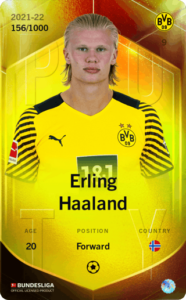
Player of the Year
Sorare frequently introduces new ideas to make the cards stand out.
Another special edition includes Legends. Sorare occasionally creates vintage cards of the greatest football legends. These players have typically retired from professional football but still have collectible value.

These cards cannot be used in regular competitions. However, you can still use these cards in special events and competitions.
Using Cards and Playing Sorare
Now that you understand the different types of cards, you can set up your first team in the tutorials. Start with the tutorials before buying your first set of player cards for real money on the transfer market. This approach has the advantage of helping you get used to the game system and gain initial practical experience.
If you can’t wait, you can also jump directly into the transfer market, assemble your winning team, and start participating in the Pro competitions right away.
Of course, we also aim to prepare you as best as possible for your managerial career with our Sorare beginner’s guide.
Competitions and Tournaments at Sorare
At Sorare, there are two ways to play:
Rivals OR Pro

Game Weeks at Sorare
Each week, there are two game weeks at Sorare during which you can participate with a team. The game weeks run from Tuesday 15:00 to Friday 14:59 (UTC) and from Friday 15:00 to Tuesday 14:59 (UTC).

All games played during these times in the licensed leagues count for the game week. Ideally, you can participate in a competition twice a week, provided you have the right cards.
You should always set up a team, even if none of your players has a game. Your cards will still receive experience points, helping to increase their level.
Rivals
In the Rivals game mode, you can compete daily for free against your friends or prove yourself in the Arena against other managers.
To play in the Arena, you need Arena tickets ![]() , which you can win with good performance. As a newcomer, you will receive your first tickets for free to get started. Additionally, you get one free play each day to compete in the Arena.
, which you can win with good performance. As a newcomer, you will receive your first tickets for free to get started. Additionally, you get one free play each day to compete in the Arena.
Once you start a game in the Arena, you’ll be placed in a league consisting of 20 players. You start in the 10th league and can move up or down each game week. Your goal should be to compete with the best of the best in the top league and win the best prizes.
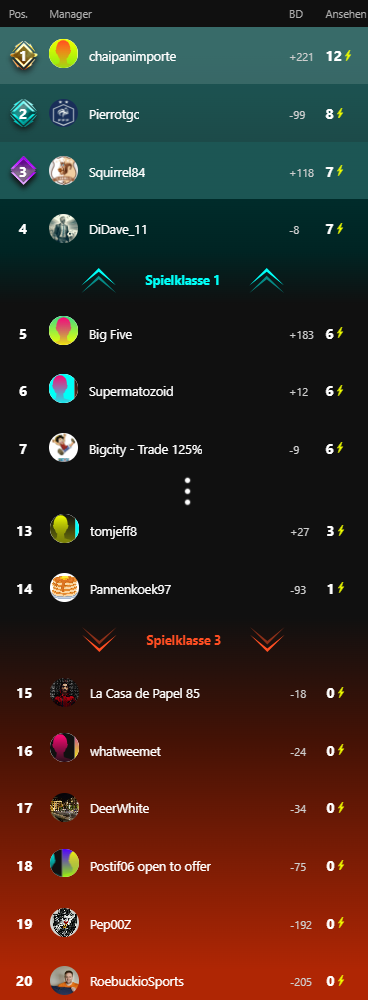
To stay in the league, you need to earn reputation. You can do this by winning Arena games. For each win in the Arena, you earn 3 points, and for each loss, 2 points are deducted from your reputation. In case of a tie, the rating difference (RD) decides. The rating difference is calculated from the results of the individual games and the points your players achieve. For example, if you win with 320 to 280 in the Arena, your rating difference is +40. If you lose the game with 280 to 320, your difference is -40.
How to Play Sorare Rivals
To score in the Arena or simply to compete in friendly matches against your friends, you set up 5 players just as you would in the Pro competitions. You can choose daily from current games in the licensed Sorare leagues and make your lineup.
In contrast to Pro Mode, where you need to finalize your lineup before each game week, in Rivals you can adjust your lineup until just before the game starts, ensuring that your players are actually playing in real matches.

Your lineup always consists of a goalkeeper, defender, midfielder, forward, and one additional player, who can be any position including goalkeeper.

For each game, you have a budget that you must not exceed for your 5 players. The budget varies depending on the game and is based on the strength of the two teams. For instance, the budget will be smaller for a game between teams at the bottom of the table compared to a game between the top two teams in a league. The budget is also lower when a top club plays against a weaker club. This can be particularly challenging, as star players are often expensive and you may be forced to fill your team with weaker players. The budget per player is based on their performance over the last 15 games.
Once you have assembled your team, you select a captain who will provide an additional 20% bonus. Additionally, you must choose a tactic, which can earn you up to 40 extra points if chosen wisely.
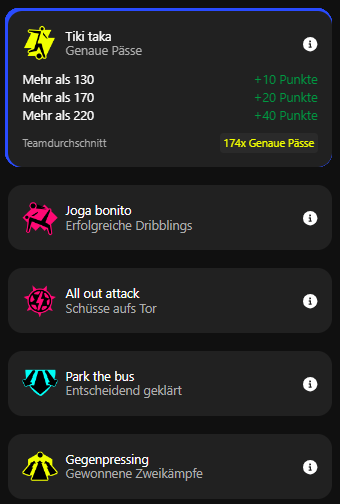
For the Tiki Taka tactic, your selected players must complete more than 130 accurate passes collectively to earn an extra 10 points for your team. The tactic can be game-changing. Sorare also provides an average score of your team’s performance with each tactic from previous games. This helps in making a decision, but it doesn’t guarantee that it’s always the best tactic. Expertise is needed here.
At the end of your lineup, you have the option to enhance your team and purchase Pro Cards to gain an additional advantage. However, this is not mandatory, especially in the lower leagues where you can perform very well without them.
Pro Cards offer an additional bonus and can be particularly beneficial in higher leagues, potentially making a significant difference.
| Limited: | +20% Bonus |
| Rare: | +25% Bonus |
| Super Rare: | +30% Bonus |
| Unique: | +35% Bonus |
Once you’ve completed your lineup, you can either challenge your friends or start a game in the Arena.

If you’d like to challenge me to a friendly match, give it a try 🙂
What’s up for grabs in Sorare Rivals
If you perform well and advance to the next league, attractive prizes await you. Every promotion comes with a Reward Box, which contains various prizes. Depending on the league and your position, there are different boxes with varying values.
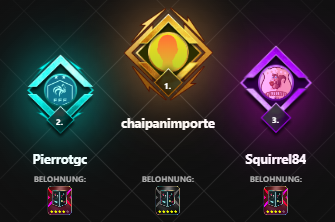
Inside the boxes, you can find Arena Tickets, current limited cards (which allow you to participate in Pro Tournaments), or special prizes like signed or unsigned jerseys (Mystery Jersey) from a team. The contents can vary from time to time.
The better the box, the higher the chance of winning a valuable prize. The boxes are categorized as follows:


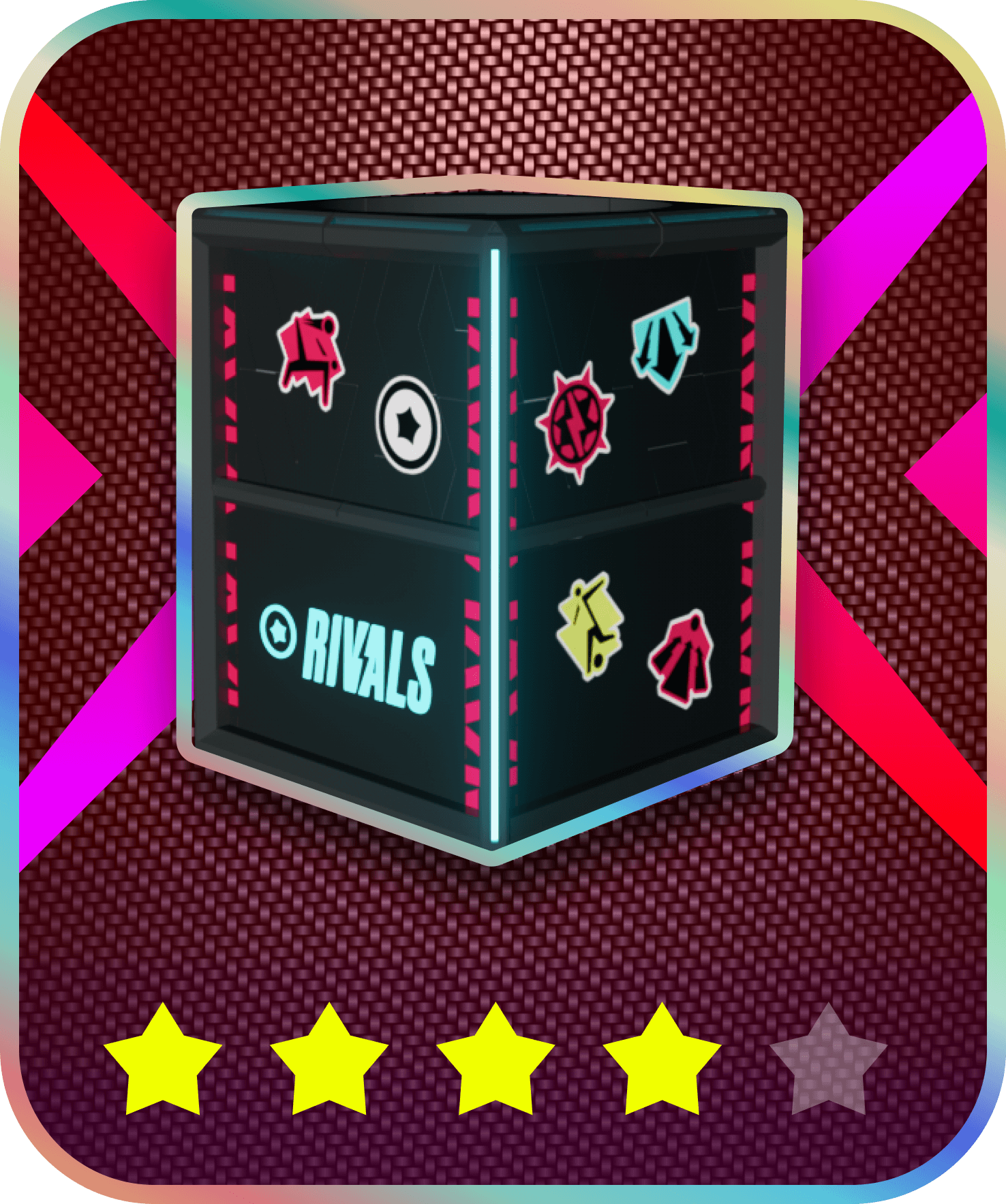

You can check the contents and probabilities by clicking on the box.
Daily Missions
In addition to prizes for advancing in the Arena, you can win more prizes through daily changing missions.

Each day features two new challenges where you can earn additional Arena Tickets. For example: Win a game in the Arena with three players from one team and two from another.
You are also rewarded for winning streaks. If you win 3 consecutive matches, you receive a Reward Box. This box also contains Arena Tickets or random Limited Cards of varying values. However, the chance of getting a card is relatively low.
Sorare Pro Mode
In addition to Rivals, which you can primarily play for free, there is also the Pro Mode.
In Pro Mode, you can use your won or purchased cards, depending on their rarity, in various competitions and win both new cards and real money.
The Pro Mode is fundamentally divided into In-Season and Classic-Season competitions, with each part having the same divisions for the respective rarities.
In-Season vs. Classic-Season
Sorare offers two options in Pro Mode to participate in different competitions:
In-Season
For all In-Season competitions, you need cards from the current season to submit your lineup. However, depending on the rarity, you can usually include at least one older card to qualify for In-Season competitions.
In In-Season competitions, it’s all about cash. Achieve a top placement here to win real money as a reward. The prize pool varies and depends on the number of participating players and the division you are competing in.
Classic-Season
In Classic-Season competitions, you can play with all cards, including those from past seasons. The prize pool includes, among other things, cash prizes, current season cards (with which you can then theoretically participate in In-Season competitions), and boxes that may contain exciting prizes.
The Different Divisions
Sorare differentiates divisions based on competitions, rarities, and the leagues in which you can set up your team.
Regular Competitions
In Pro Mode, Sorare features three regularly occurring competitions, all with the same structure. A competition is open whenever there are enough games taking place for that competition.
The competitions are categorized as Champions, Challengers, and Contenders, mainly based on the teams eligible for play in these competitions.

You can set up players from leagues currently licensed by Sorare. What matters is the club where the player currently plays, not the club listed on the card.
- Champions: Premier League, La Liga, Bundesliga, Serie A, & French Ligue 1
- Challengers: Eredivisie, Campeonato Brasileiro Série A, Primeira Liga, Football League Championship, Süper Lig, Jupiler Pro League, Superliga, Major League Soccer
- Contenders: Liga MX, Russian Premier League, Superliga Argentina de Fútbol, Austrian Bundesliga, Premiership, SuperSport HNL, Super League, J1 League, Eliteserien, French Ligue 2, La Liga HyperMotion, Serie B, 2. Bundesliga, K League 1, Primera División de Chile, Liga Pro, Primera División del Perú, Chinese Super League, Primera A
In addition to these 3 regular competitions, there are more competitions that I will explain in detail later.
Rarities

Each competition is divided by the rarities of the playable cards. You’ll find competitions for Limited, Rare, Super Rare, and Unique cards.
For each competition, you can use cards of the respective rarity and always need a set of at least 5 players (GK, DEF, MID, FWD, EXTRA) of a single rarity to participate. However, you can always fill your lineup with rarer cards. For example, for Limited, you can use all cards (except Common). This includes cards of rarities such as Rare, Super Rare, or Unique. For the Super Rare competition, you need a team of at least 5 players of the Super Rare or Unique rarity.
Using rarer cards doesn’t give you an advantage but helps fill your team if you cannot yet play in the higher divisions.
In the regular competitions, you can set up up to 3 teams per rarity for both In-Season and Classic-Season, which compete independently for the prize pool. This means you could theoretically be First, Second, and Third at the same time if you have the right player cards.
Each team you set up participates in different divisions or leagues. You always start in the weakest division.
Divisions
Competitions are divided into different divisions based on rarity.

| limited | 5 Divisions |
| rare | 4 Divisions |
| super rare | 3 Divisions |
| unique | 1 Divisions |
For each regular competition (except Unique), whether In-Season or Classic-Season, Limited or Super Rare, in which you participate, there is a chance to both rise and fall in the rankings.
You always start in the lowest division and can advance to the next higher division with good results. The higher you advance, the better the prize pool becomes. Your team score is crucial here.
If you get promoted and then field a weak team, you will drop back down for the next game week.
The Beginner Tutorial
If you’re completely new to Sorare, you can still play the Pro Mode. Normally, you need a set of at least Limited rarity cards to participate in the competitions.

In the Beginner Tutorial, however, you have the chance to win cards without spending money, allowing you to participate in other Pro competitions.
For each regular competition (Champions, Challengers, Contenders), you can set up a team in the Basic Tutorial or the Advanced Tutorial and win a reward box with Arena Tickets (usable for Rivals) and Limited cards that you can then use for Pro competitions.
In the Basic Tutorial, you can choose from all players and start with common cards. You can also use Limited cards if you already have some.
In the Advanced Tutorial, you need a set of Limited cards but can fill the rest of your lineup with common cards.
The tutorials are only available to new Sorare users who do not yet own 10 cards. Once you have won or purchased your 10th card, you can no longer participate in the tutorials.
Special Competitions
Sorare also occasionally features so-called Specials. These have different participation requirements compared to the regular competitions. Sorare often introduces creative ideas for these.
Here are a few examples of irregularly occurring competitions:
Under 23
This competition is limited to players who are a maximum of 23 years old. The actual age counts, not the age on the card. This competition is currently held regularly but is not divided into divisions, and you can only set up one team per game week.
All Star
In the All Star League, you can use all cards of the respective rarity.
Legends Challenge
As mentioned earlier in our Sorare guide, Sorare features Legend cards. You can use these cards in this league. You need at least one Legend card of the respective rarity for your lineup, which you can then fill with any other cards of that rarity.
Cap 220
In these competitions, the total strength of your players is capped at 220 points, based on their average performance over the last 15 games. This is displayed during selection.
Cap 240
The Cap 240 works similarly to Cap 220, but with a budget of 240 points.
A positive feature of Cap 240 is that anyone who reaches a score of at least 270 receives a monetary reward, regardless of whether they place in the prize rankings. However, you need to decide in advance which prize tier you aim for.For example, in the Limited competition, cash prizes vary by rarity. If you set a target of 390 points and don’t achieve it, you go home empty-handed.

Cap 270
Here, there is also a maximum player strength of 270 points.
Individual Leagues and Competitions
Specials for individual leagues, such as the Premier League, often occur, allowing you to participate with the appropriate player cards.
Special competitions for tournaments like the European Championship or World Cup are also occasionally featured.
Academy
For cards that don’t fit into your starting lineup, there is the Academy. Here, you can park all the cards that you haven’t used elsewhere. You must still set up a complete team.
In the Academy, your cards gain experience points and can level up. Unlike conventional leagues, cards in the Academy receive double experience points. Initially, you can set up a maximum of 3 teams to accumulate experience points for all your cards.
You start with 3 Academy slots but can purchase additional slots from the Club Shop. However, you cannot pay with real money (ETH) but need coins, which you can also earn on game days.
Register at Sorare and get a 50% discount*
Starting Lineup
Now that you know which cards and competitions are available, you can set up your first team and participate in a competition. To do this, open the next game week. You can find it by clicking on “Upcoming” when you click on “Play.” Next, choose the league where you want to set up your team.
As mentioned earlier, it’s best to start by playing in the Amateur League with the common cards before purchasing a set from the transfer market.

To set up a team, you need at least 5 cards. You must include a goalkeeper, a defender, a midfielder, and a forward. For the 5th card (Extra), you can choose any position except for a goalkeeper to complete your team.
Positions in the Starting Lineup
When you click on an empty position in your starting lineup, you’ll usually see which players are available for that position. You can then select the player you believe will score the most points in the next game.

Typically, only players who have a game in the upcoming game week and haven’t been used in another league will be shown. However, you can use the filter options to view all possible players. You can see under the player’s name whether they have a game in the game week (game displayed) or not (KS). If they don’t have a game, they cannot earn points for your team. However, you can still select them to fill gaps.
Additionally, if the filter is activated, you can see if the player has already been used in another lineup. If you add them anyway, they will be removed from the other lineup.
If you don’t see any players available for a position, it might be that you don’t have a card eligible for that position in the league. Another reason could be that you’ve already used all suitable players in another league (e.g., in the Training League) or the player doesn’t have a game (KS) in the game week. You can easily check this by activating the filters.
Check the boxes for “Used in another lineup” and “No game this week (KS).” You will then see all the cards that are eligible for that position. You can still add them to your starting lineup, but keep in mind that these cards will be removed from other competitions.
The Captain
Once you have found a card for each position, you need to appoint a captain. The captain gets an additional card bonus of 20% and thus generates more points for your team. In some competitions and in training, there is no captain, and therefore no additional bonus. When you can choose a captain, you’ll see the “K” on the player’s card in the image.

You can now confirm your starting lineup, and your team is registered for the next game week. Now your players just need to score points.
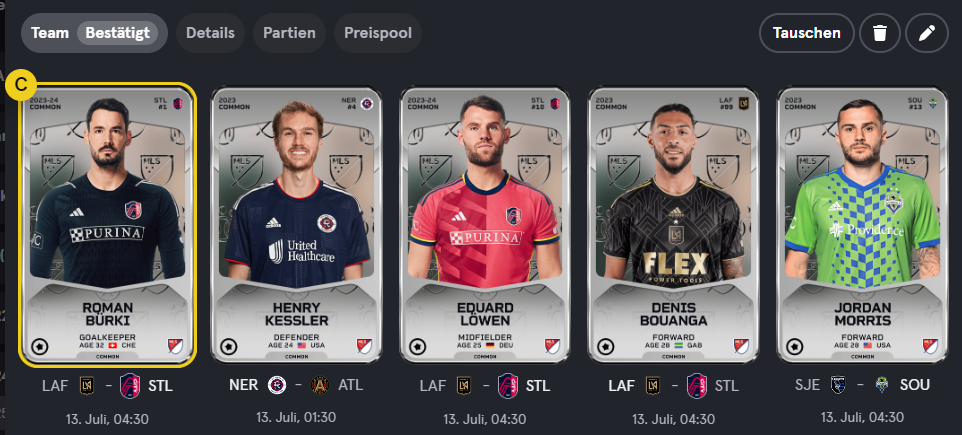
The Sorare Scoring System
To score points and win attractive prizes on Sorare, the players of your cards need to perform well in real-life games.
The Sorare scoring system consists of three components: the Team Score, the Card Score, and the Player Score. The goal is to achieve the highest total score with your team (consisting of 5 cards) in a game week.
Player Rating (Player Score)
Each player can achieve a rating (Score) of 0-100 points per game. The player’s rating is based on positive and negative actions during the game and is calculated from the Decisive Score + All-Around Score. You can view the player’s rating in detail during and after the game by clicking on the player.
Decisive Score
The Decisive Score accounts for key actions that impact the game. The sum of positive (+1) and negative (-1) actions determines the player’s level for the rating. The following table shows the score based on the sum of positive and negative actions (Level) in the game.
| Level | -3 | -2 | -1 | 0 | 1 | 2 | 3 | 4 | 5 |
| Points | 0 | 5 | 15 | 35 | 60 | 70 | 80 | 90 | 100 |

Each player starts at Level 0 and receives 35 points if they start the game and 25 points if they are substituted in. For each decisive action, they move up one level (positive action) or down one level (negative action).
Positive Actions: Goal, Assist, Drawn penalty, Clear on the line, Last-man tackle, Saved penalty (goalkeeper only), Clean sheet (goalkeeper only)
Negative Actions: Red card, Own goal, Conceded penalty, Error leading to a goal, 3+ goals conceded (goalkeeper only)
For example, if a player scores a goal (+1) and provides an assist (+1), they would receive a Decisive Score of 70 points for Level 2 (2 positive actions). If the same player causes a penalty (-1), they would drop a level and receive only 60 points for Level 1 (2 positive actions – 1 negative action).
All-Around Score

The All-Around Score is calculated from less decisive actions of a player in the game. Such actions include the number of duels won and lost, fouls, yellow cards, shots on goal, goalkeeper saves, or successful passes. Different positions have different rating criteria. A complete list of the criteria for the All-Around Score can be found [HERE].

Together with the Decisive Score, this forms the Player Score. Even if a player’s total score exceeds 100 points, they will receive a maximum of 100 points per game. Additionally, the score cannot go negative, so there are no negative points even for very poor performance.
Card Score
The Card Score is derived from the Player Score and the card bonus. For example, if a player receives a score of 60 points and your card has a 5% bonus, the Card Score for this card would be 63 points for the Team Score.
It is also possible for a card to score more than 100 points.
Team Score
The Team Score is the sum of the points from all the cards used. This score determines your ranking in the league for the end of the game week.
Prizes and Prize Pools
In each game week, there are prizes to be won in every league you participate in. Depending on your team’s performance, you can win new player cards, cash in crypto or FIAT, or surprise boxes.
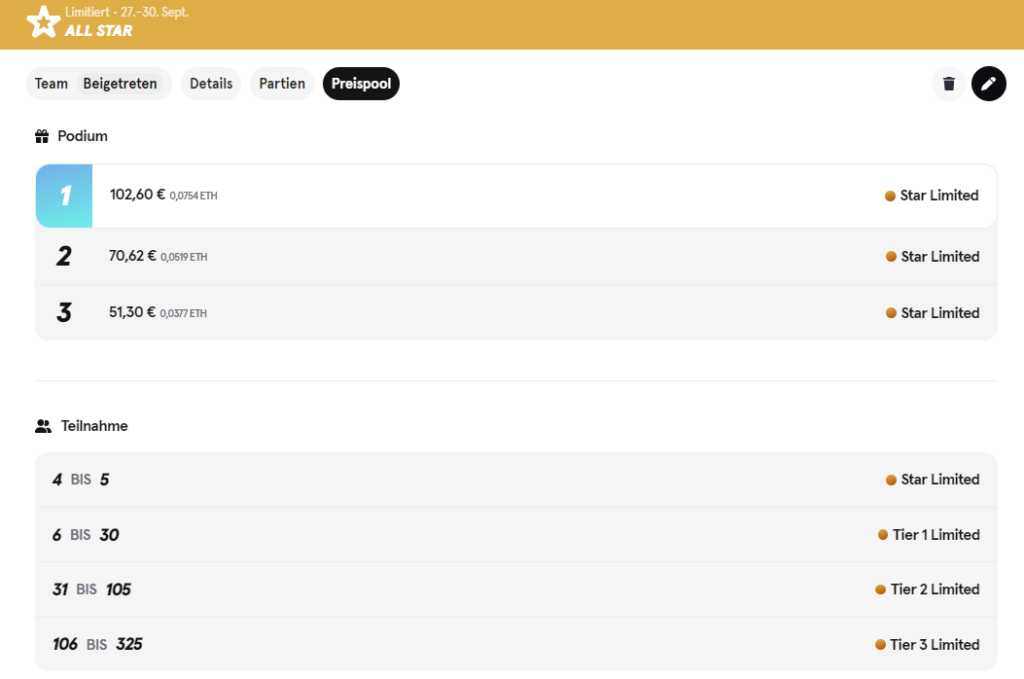
The prize pool depends on the number of games played in each licensed league during the game week. Usually, the top 10% of all participating managers will make it to the prize ranks. This can vary from week to week.
Reward Boxes
You can win reward boxes or chests in both Rivals and the Classic Season. There are different types of chests with various contents.
Typically, you might find items, arena tickets, limited cards, or jerseys (Mystery Jerseys) in these box. What you get is determined by chance, but you can preview what might be inside and the probability of each item by clicking on the chest in the Prize Pool view.

The better the box, the higher the chance of winning a valuable prize.
Mystery Jerseys are currently the rarest prizes within the boxes. These can be jerseys from any team, and sometimes even signed jerseys.
The Different Tiers
There are many cards to win, and Sorare distinguishes between 6 tiers (also known as Tiers) that represent the value of a player. The better and more valuable a player is, the lower their tier. Therefore, Tier 0 or Star Tier represents the best players in the world, while Tier 5 represents the weaker players, though this does not mean they can’t score points.
When you look at the prize pool for a league, you will find a button at the bottom for Tier information. Here, you can see all the players in the different tiers that are included or were included in that round.
Buying Sorare Cards (Transfer Market)
Once you understand the system and have completed a few game weeks with your basic cards, you can start investing in your team.
If you are not yet a member of Sorare, it’s best to register through this link*. By doing so, you’ll receive a free random limited Sorare card with the purchase of 5 limited cards.
If you are new and have no experience with Sorare, please read the earlier part of this Sorare guide first, as mistakes made at the beginning can be very costly.
Buying a Team
To win real money or player cards in the form of NFTs, you need a strong team that regularly earns points. Take your time and select the right players. Start by focusing on one game tier and buy your set of cards suitable for that tier. Also, consider the participation requirements for the individual leagues.
You need at least 5 Sorare cards, which you can obtain through new card auctions, pack auctions, or manager sales.
With 5 cards, you can participate in competitions, but it’s advisable to have a backup player in case someone gets injured or cannot play for other reasons.
You can also stock up with young talents who might not play in every game.
Paying for Your Team
Since we’re talking about buying cards with real money, you need to pay for the cards. Sorare uses the cryptocurrency Ethereum (ETH) for transactions. ETH is the base currency, although prices are often displayed in your local currency. This is just a conversion based on the current exchange rate and is meant for orientation.

You can pay directly with a credit card or Google Pay. Here, the ETH value is converted into Euros based on the current exchange rate and charged to your credit card. Sorare charges a 10% fee for direct purchases via credit card or Google Pay.
To avoid this fee, you can deposit Ethereum into your Sorare account and purchase players from your balance.

You can deposit Ethereum either through external providers like RAMP or Moonpay (note that fees apply), where your Euro amount is converted to ETH at the current rate, or you can transfer Ethereum directly from your cryptocurrency wallet to Sorare. However, be aware that not all wallets are supported.
Determining the Market Value of a Player
Before buying a card, you should get an overview of the player’s market value. You can check current offers on the transfer market for a quick overview. However, this may not always reflect reality. Also, review recent purchases or sales of the cards.
When you view all cards of a player, you will first see the current manager sale offers, then the auctions (which you should ignore if they haven’t sold yet), and further down, the recent transactions with the corresponding sale prices. This provides a good reference for assessing the market value.
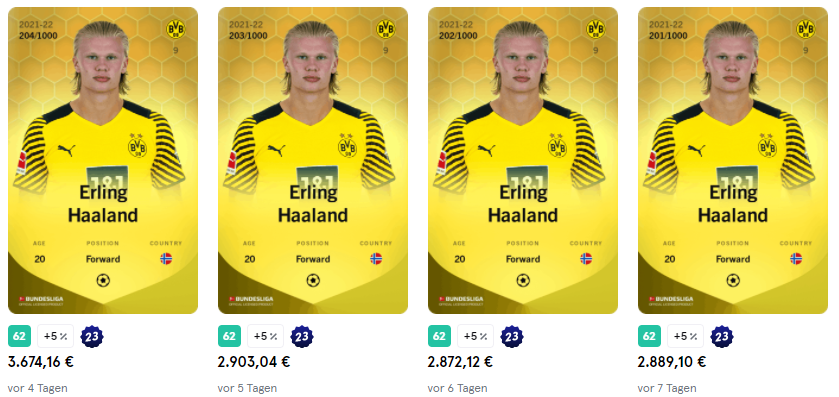
If you want an even better overview of current player market values, you can use Sorare Data.
Auctions for New Cards
Every day, new cards are created by Sorare that you can bid on in an auction. The principle is relatively simple: the manager with the highest bid wins the auction and thus the Sorare card as an NFT.

Auctions typically last between 2-4 days, although most bids are made in the last minutes. Therefore, it is usually not worth bidding on a card that still has over an hour left.
There is a peculiarity in Sorare auctions. You can’t snag a last-second bargain! Any bid placed with less than a minute remaining resets the auction time back to one minute. This gives competitors additional time to place another bid.
Manager Sales
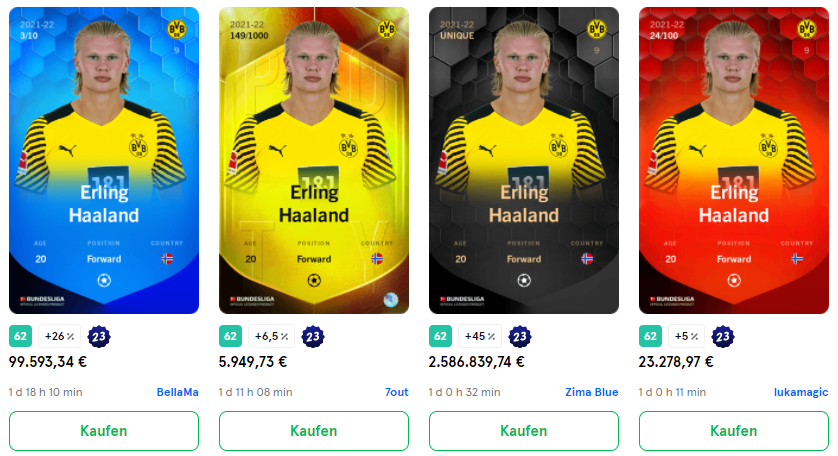
If you don’t want to wait for the right players to appear in auctions or packs, you can buy most players directly on the transfer market. However, the rarer the card, the less likely you are to find it on the market. Limited cards are available for almost every player, except for young talents who are often held and less frequently sold.
If the player is too expensive, you can also make an offer for the card directly to the current owner.
Offer to Other Managers
If you can’t find a card on the transfer market and don’t want to wait for a new auction, you can make a direct offer to another manager.

Simply choose a card of the player you want and make an offer to the owner via the Trade function.

You can make an attractive financial offer or include cards from your own collection in your offer. The owner then has a certain amount of time to decide. Note that your money will be held until the offer is accepted or rejected.
Offers are binding, but you can withdraw the offer if the other manager has not yet decided.
Summary
I hope this Sorare beginner’s guide has helped you and prepared you well for your first steps with Sorare. If it has, please consider giving this article a positive rating. If you have questions or suggestions, feel free to leave them in the comments.
Sorare is an exciting fantasy football manager game that is fun both in the Casual League and with your own purchased team. The fact that real values are involved makes the game even more appealing.
I hope you enjoy it as much as I do.
